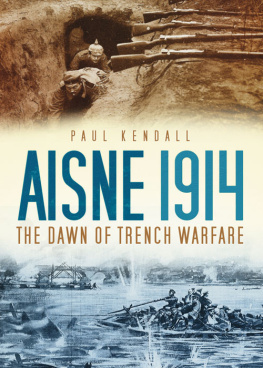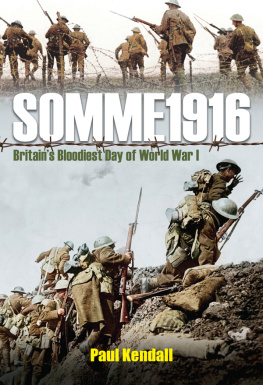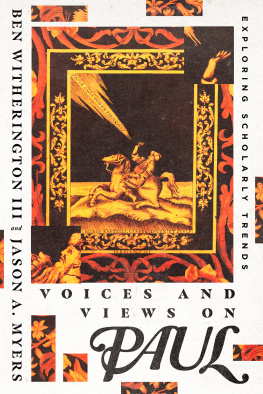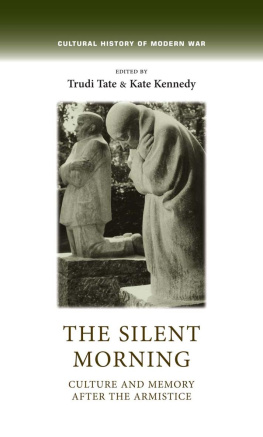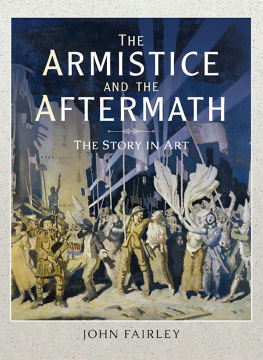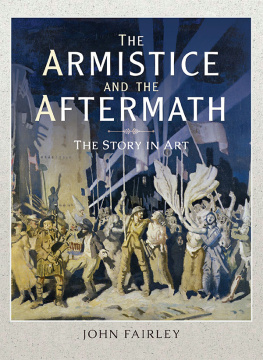Armistice 1918
Also by Paul Kendall
Aisne 1914: The Dawn of Trench Warfare
The Zeebrugge Raid 1918: The Finest Feat of Arms
Bullecourt 1917: Breaching the Hindenburg Line
Aisne 1914: The Dawn of Trench Warfare
Somme 1916: Success and Failure on the First Day of the Battle of the Somme
The Battle of Neuve Chapelle: Britains Forgotten Offensive of 1915
The Zeebrugge Raid 1918: A Story of Courage and Sacrifice Told Through Newspaper Reports, Official Documents and the Accounts of Those Who Were There
Armistice 1918
Paul Kendall
ARMISTICE 1918
The Last Days of The First World War Told Through Newspaper Reports, Official Documents and the Accounts of Those Who Were There
This edition published in 2017 by Frontline Books,
an imprint of Pen & Sword Books Ltd,
47 Church Street, Barnsley, S. Yorkshire, S70 2AS
Copyright Paul Kendall
The right of Paul Kendall to be identified as the author of this work has been asserted by him in accordance with the Copyright, Designs and Patents Act 1988.
ISBN: 978-1-84832-461-9
eISBN: 978-1-84832-466-4
Mobi ISBN: 978-1-84832-465-7
All rights reserved. No part of this publication may be reproduced, stored in or introduced into a retrieval system, or transmitted, in any form, or by any means (electronic, mechanical, photocopying, recording or otherwise) without the prior written permission of the publisher. Any person who does any unauthorized act in relation to this publication may be liable to criminal prosecution and civil claims for damages.
CIP data records for this title are available from the British Library
For more information on our books, please visit
www.frontline-books.com
email
or write to us at the above address.
Acknowledgements
T he following organisations have assisted me greatly with permission to include material from their archives and without their assistance this book would have been difficult to produce. I thank the Imperial War Museum Department of Documents and Sound for allowing me to quote from the papers and sound interviews that are held within its archives, and in particular Anthony Richards and Richard Hughes.
I also thank Stephen Clatworthy and the Special Collections Department, Liddle Collection at the University of Leeds for permission to quote from its archives.
I am indebted to the National Archives ( www.nationalarchives.gov.uk ) for using the numerous war diaries that are stored in its archives. Newspapers are also an excellent resource at the British Newspaper Archives ( www.britishnewspaperarchive.co.uk ) and it is always a joy to step back in time as I study them.
I thank the Australian War Memorial, National Library of Australia and National Library of New Zealand for the documents within their archives that I have featured within this volume.
I extend my gratitude to David Cade for kindly supplying me with photos and information relating to his father, Sergeant Albert Cade.
I am extremely thankful to Thomas Buffenbarger at the US Army War College Library, US Army Heritage and Education Centre, Carlisle, Pennsylvannia, for his enthusiasm and support, and for providing me with selected testimonies from its archives.
I am grateful to Norm Christie, president of CEF Books, for allowing me to quote from Will Birds memoirs, Ghosts Have Warm Hands ; and the President Harry S. Truman Library and Museum for granting permission to quote from the letters held within its archive.
I would like to thank Yves Fohlen for providing and translating testimonies from the French war diaries that feature within this book, for proof reading this volume and for his continued friendship, support and counsel while I have been working on this project.
Finally, I am grateful to Martin Mace, for his enthusiasm and for encouraging me to write this book, and John Grehan for his advice and guidance. I thank them both for providing me with the opportunity to contribute to the Voices from the Past series and to write a book relating to the Armistice 1918.
Please note that when referring to the men who are included within this book, they are referred at the rank that they held at that time.
Every reasonable effort has been made to contact the copyright holders of the material that features within this book to seek copyright permission. Apologies if any copyright holder has not been acknowledged. If so, please contact the publishers and corrections will be made in reprinted editions.
Introduction
T he stalemate of trench warfare and the ceaseless slaughter continued into the beginning of 1918 with both Allied and German forces worn down. With the chances of peace being extremely remote, Field Marshal Sir Douglas Haig, Commander-in-Chief of the British Expeditionary Force (BEF), continued his strategy to wear down German forces until they surrendered. The Allied campaign of attrition exhausted German forces holding the Western Front, while the blockade enforced by the Royal Navy was succeeding in directly impacting upon the German people, economy and food supplies. Kaiser Wilhelm II and his commanders were concerned that the fatigued Allied forces would eventually be reinforced by American troops and they would eventually exceed the strength of the German Army, providing their enemy with an advantage on the Western Front and the likely prospect of an Allied victory.
The first contingent of the American Expeditionary Force (AEF) reached France on 28 June 1917 with the arrival of 28,000 soldiers from 1st Division, but they needed training before they entered the trenches. General John Pershing, commander of the AEF, was insistent that his soldiers would fight as one unit, once they had completed their training. It was estimated that it would take two further years for the AEF in France to train and prepare themselves for war. This would mean that they would not be able to play an effective part until 1919 or 1920. Time was also needed to transport materials, artillery, munitions and equipment from the United States to sustain their operations in France. However, the Allies were at breaking point and could not wait that long. As a temporary measure, it was agreed that American divisions that had completed their training and were deemed competent to enter the trenches would be assimilated among French and British units where needed.






